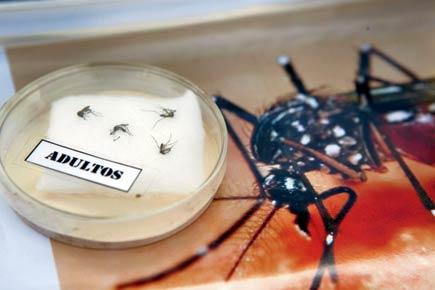The Zika virus, which originated in Africa, can spread to countries that have the aggressive Aedes aegypti mosquito, said WHO

Geneva: The Zika virus is can infect up to four million people, the WHO said in a warning it issued to all countries who have the vector of Aedes mosquito that also causes Dengue and Chikungunya.
ADVERTISEMENT

The Aedes aegypti specimens displayed by the Peruvian Health Ministry in Lima. Pic/AFP
The Zika virus is caused by the aggressive Aedes aegypti mosquito that also causes Dengue and Chikungunya, both the viral diseases are of great public health concern to tropical countries like India.
The outbreak began in Brazil last year and has now spread to 24 countries in the Americas, causing serious birth defects and other neurological problems like microcephaly, a condition that causes babies to be born with an abnormally small head.
Dr Marcos Espinal, Director of Communicable Diseases and Health Analysis at WHO, warned that Zika “will go everywhere the mosquito is. We should assume that. We should not wait for it to spread.”
Zika originated in Africa and also exists in Asia. Meanwhile, WHO chief Margaret Chan expressed concern over the potential of global spread of the disease, owing to the large geographical spread of the Aedes mosquito.
Bruce Aylward, Assistant Director-General, WHO, also warned that the virus could spread to other places wherever there is Aedes mosquitoes. “What we have to assume is anywhere where they have the Aedes (mosquitoes), they could have the Zika virus and they should have the tools to be able to look for it,” he said.
“So, that’s part of the reason we are trying to get the information out to countries that have got the vector but may not yet have the virus - look now for the virus,” he added.
Such is the level of alarm that many American countries like El Salvador, Colombia and Ecuador have urged women to postpone pregnancy till 2018.
Complicating matters further, the Olympics in 2016 is to be held in Rio, the epicenter of the virus outbreak. The concern is also related to lack of immunity of the population that are unexposed to the Zika virus. Additionally, there are no vaccines, specific treatments, and rapid diagnostic tests, available to combat the virus.
 Subscribe today by clicking the link and stay updated with the latest news!" Click here!
Subscribe today by clicking the link and stay updated with the latest news!" Click here!






